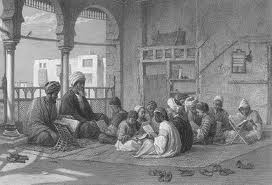MODERN AND TRADITIONAL ISLAMIC EDUCATION
Modern And Traditional Islamic Education - Traditional education (concepts) are highly stressed the importance of mastery learning materials. According to this concept the ratio memory play an important role in the learning process in schools. Traditional education has become the dominant system in primary and secondary education level since the second half of abak, and represents the culmination of a search over the ' best ' one system.
The main characteristic of the traditional education is: (1) children
are usually sent to school in a particular geographical area of the
district, (2) they are then put into the classes that typically
dibedabedakan based on age, (3) children attend school at each level
according to how their age at the time, (4) any class of their depleted
one academic year, (5) the principle of otoritarian school, kids should
conform to benchmark existing behavior , (6) shoulder the responsibility
of teacher instruction, regardeth the curriculum that has been set, (7)
most of the lessons are directed by teachers and text-oriented, (8)
Promotion depends on the assessment of teachers, (9) a curriculum
centered on the subject of educator, (10) the most common materials are
listed in the curriculum are textbooks (Vernon Smith, in, Paulo Freire,
et al, 1999:164-165).
 |
| Modern And Traditional Islamic Education |
Read Also : Tips On Islamic Education In Children Early
Further, according to Vernon Smith, traditional education based on several assumptions that are generally acceptable to the people even though it is not accompanied by proof of reliability or validity. For example: 1). There is a collection of certain important knowledge and skills that must be learned kids; 2.) the best place for most children to study the elements of this is the formal school, and 3). the best way so that kids can learn is grouping them into classes that are assigned based on their age (Vernon Smith, in, Paulo Freire, et al, 1999:165).
That has been said Vernon Smith is also experienced by Islamic education in Indonesia until this decade. For example: most boarding school, Madrassa, and Islamic educational institutions others still adhere to the old system, the curriculum is the set of packages that have to be resolved, the curriculum was made without or very little context or relevance to the social conditions of society even little memperhatika and anticipate the changing times, a system of learning-oriented or centered on the teacher. The paradigm of traditional education is not something wrong or less good, but growing education model and in accordance with his age, certainly also have pros and cons in empowering human beings, when viewed from the modern era.
The concept of modern education (new concept); the concept of education which touches every aspect of the lives of learners, education is a process of continuous learning, education is affected by the conditions and experience, both within and outside the school situation, education is affected by the ability and interest of students, it is also appropriate and effective learning situation whether or not then and not how to teach (Dimyati Machmud, 1979:3). Education on modern society or a society moving towards modern (modernizing), such as Indonesia, society basically functions provide the link between student with its social environment continues to change rapidly.
Shipman (1972:33-35), which quoted Azyumardi Azra (muslim scholars), said that the principal function of education in modern society the central building consists of three parts: (1) dissemination, (2) learning (schooling), and (3) education (education). First, as the institutions of socialization, education is a vehicle for the integration of students into the values of the dominant group or national. Second, learning (schooling) prepare them to achieve and certain socio-economic positions and, therefore, should be able to membekalai learning, learners with job qualifications and professions that will make them able to play the role of sosialekonomis in the community. Third, education is the "education" to create an elite group which in turn will contribute to the continuation of development programs "(Azyumardi Azra, in the Marwan Saridjo, 1996:3).
Labels: Islamic Education, ISLAMIC EDUCATION FOR CHILDREN
